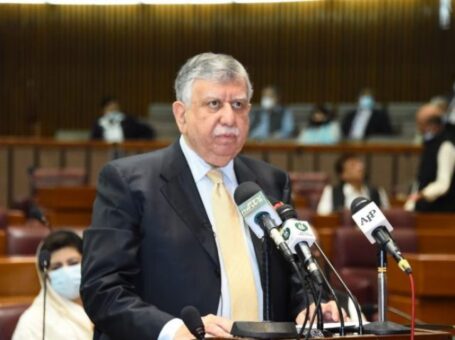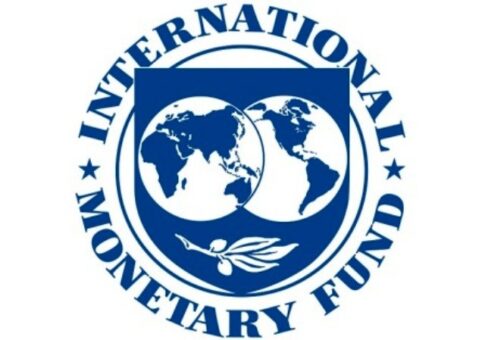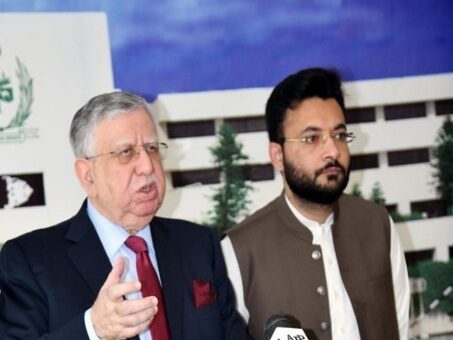ISLAMABAD: Pakistan’s Finance Minister Shaukat Tarin on Wednesday said International Monetary Fund (IMF) should not object to the relief package announced by the prime minister as the country is generating own resources for the package besides increasing the revenue.
The Finance Minister addressing a new conference here said negotiations have been held with the IMF over this relief package announced by the Prime Minister. He said the IMF should not have objections on the package as we are meeting it from our own resources including enhancement in tax revenues. He said this will not increase our fiscal deficit.
READ MORE: PM Imran reduces, freezes POL prices
Finance Minister Shaukat Tarin said the government is providing a subsidy of one hundred and four billion rupees on petroleum products in order to provide relief to the people.
He said given soaring prices of petroleum products in the international market, we have reduced the petroleum levy and brought to zero the sales tax.
Tarin said that those using seven hundred units of electricity per month will be provided with subsidy of five rupees per unit for the next four months. For this, he said, we will have to give a subsidy of 136 billion rupees.
Shaukat Tarin said the government has also given industrial relief package to promote industries in the country. He said the package envisages tax holiday for overseas Pakistanis and incentives for the turnaround of sick industries.
READ MORE: Businessmen hope $5bn investment under PM package
The Finance Minister said tax exemptions have also been given to the IT sector in order to significantly bolster its exports. He pointed out that the IT sector grew by forty seven percent last year and currently growing by seventy percent. He said we target one hundred percent growth in this sector during the next year. Shaukat Tarin said our trade deficit has also come down.
Highlights of the press conference:
Petroleum relief: Prior to Prime Minister’s relief package, govt. was bearing Rs 39 billion fortnightly loss through budgeted PL and Sales tax. At that time, levy on petroleum was Rs17.92 per litre and on Diesel, it was Rs13.30 per litre. With the increase in international prices and Prime Minister’s relief Package, the government will further incur loss of Rs 13.9 billion and fortnightly loss will expand to Rs52 billion. Now petroleum levy and sales tax reduced to zero percent (except for petrol Rs1.8 per Litre)
The estimated budget loss in the next four months would be Rs250-300 billion just from petroleum relief with the assumption of $100/bbl weighted average international price.
Electricity relief: Prime Minister announced reduction of Rs. 5 per unit in base rate for four months consecutively. The package will be applicable to all commercial & domestic non-ToU ( non -Time of Use) consumers having monthly consumption up to 700 units, excluding lifeline consumers. Overall relief is estimated at Rs 136 billion.
Industrial package:
READ MORE: Tax amnesty launched for setting up new industrial units
1- Investment in new industrial units and expansion and modernization of existing units. 5 per cent across the board payment of tax for all amount invested Minimum investment threshold is Rs. 50 million.
Industrial unit to be set-up as a company Commercial production to begin by June 30, 2024. Previous beneficiaries of Amnesty Schemes of 2018 and 2019 will not eligible. Bank loan defaulters in last three years will not be eligible.
2- Incentive for Revival of Sick Units
Applicable only to companies. Industrial units facing accumulated losses in continuous 3 years to be treated as sick units.
Acquiring company allowed to adjust losses of the sick units against its income for consecutive three years.
Revival of the sick unit to be completed within three years of acquisition. Incentive for Foreign Investment in Industrial Sector.
3- Incentives for Overseas
Pakistan citizens who are non-resident for five years and resident Pakistani having declared foreign assets are eligible to invest.
One-time tax credit equal to 100 per cent of PKR equivalent of remittance to be availed in 5 years. Investment to be made in a new industrial unit. Commercial production to start by 30th June, 2024. New industrial unit to be a company
IT package:
READ MORE: PM Imran directs implementing incentives for IT industry
• Tax exemption for IT/TES (Information Technology Enabled Services) firms & free lancers for 5 years.
• Reduction in Capital Gain Tax on VC funding into Start ups to zero percent during 5 years.
• In a historic move, PM has directed to allow IT/ITeS(Information Technology Enabled Services) Companies and Freelancers to retain 100 per cent amount of remittances received through proper banking channels, in FCY Accounts, without any compulsion to convert them into PKR.
• Furthermore, there will be no restriction on outward remittances from FCY account for PSEB registered IT Companies and Freelancers.
• Prime Minister has also directed SBP to introduce Financing streams for IT/ITeS sector and Freelancers keeping in view operational architecture and industry needs for these sectors.
• Recommendations of Pakistan Technology Start-up Fund were also approved by the Prime Minister as part of this historic package for the creation of a Public Private Partnership (PPP) venture capital fund. Ignite National Technology Fund will create this Fund through PPP.
READ MORE: ECC approves Ramzan relief package worth Rs8.28 bn
Benefits:
• Bringing internationally parked Foreign Currency to Pakistan.
• Encourage foreign companies to shift business to Pakistan.
• Employment creation and entrepreneurship promotion in the country.
Trade Deficit:
US $ mn November December January February Exports 2901 2765 2614 2808 Imports 7899 7666 6891 5903 Trade deficit 4998 4901 4277 3095
• Significant decline in trade deficit due to significant decline in imports in the month of January & February.
• Compared to 1HFY22, the current account deficit expected to decline in 2HGFY22. Already visible from trade deficit.
• The CAD reported by SBP is higher due to some imports not reflected at PBS data due to sensitive nature but recorded by EAD. Importantly, the import differential is funded.
• It is pertinent to note that trade deficit is lowest since June 2021. This will bring the deficit down significantly.
Inflation:
• February CPI is lower at 12.2 per cent as compared with 13 per cent in January.
• Adjusted with tomatoes prices the February inflation would have been 10.8 per cent YoY basis.
• Similarly, if we adjust the month on month tomatoes prices, the inflation would have been only 0.6 per cent, on month-on-month basis.
• It is pertinent to note that prices are flat since November 2021, month-on-month basis. Dec (-0.02 per cent), January (0.4 per cent) and February (0.6 per cent) adjusted with tomatoes prices.
• Lastly, Core inflation is witnessing a declining trend in February at 7.8 per cent as compared with 8.2 per cent in January.
• Going forward, it is expected that tomatoes prices will experience decline from mid March due to arrival of crop in Punjab. First week prices of Tomatoes have already declined by 27 per cent.
Key Takeaways of OICCI Press Conference:
• 207 Companies have invested $18.5 billion since 2012. They pay one 3rd of our taxes.
• They believe Pakistan is better than 6 out of 10 regional countries in 2021 verses 3 out of 10 in 2019.
• In 2021, 68 per cent expect accelerating growth in their businesses in the next 2-3 years vs only 27 per cent in 2019.
• They want long-term policies to be prepared by the government to help them invest in Pakistan. Moreover, they want further improvement in ease of doing business.
• Given, the significant improvement in business climate, they want to conduct international road shows to showcase the opportunities in Pakistan.
? Sehat Sahulat Program (Beneficiary Satisfaction Based on 3rd Party Feedback Survey)
Satisfaction rate ( per cent) Total Complaints Total Resolved Total Hospital Visits Total Families Enrolled 97 68,767 67,425 3,247,198 27,694,903
• 96 per cent beneficiaries are satisfied with the treatment provided by Sehat Sahulat program.
• 54 per cent beneficiaries are satisfied with the hospital services.
• 97 per cent beneficiaries are satisfied with the hospital staff behavior.
• 98 per cent beneficiaries are satisfied with Sehat Sahulat program staff behavior at hospital.
• 98 per cent beneficiaries were not asked to pay for services during treatment.




